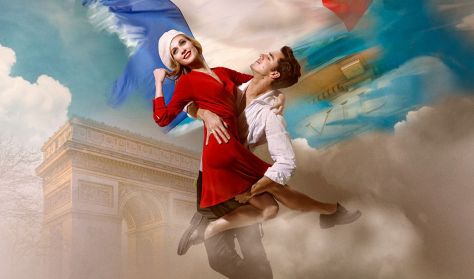Vaszilij Vajnonen / Michael Messerer / Borisz Aszafjev: Párizs lángjai
A francia forradalom idején játszódó, sodró erejű és tempójú Párizs lángjai az egyik legsikeresebbnek mondható szovjet balett, melynek első előadásai során a közönség állva, egy emberként énekelte a művészekkel a La Marseillaise-t. Kifejezett újításnak számított akkor és ott az alkotók közös törekvése, hogy vérbeli balettdrámát hozzanak létre. A balett-történetnek ezen emblematikus darabjában a táncosoknak egyszerre kell magas fokon birtokában lenniük a klasszikus balett-technikának és a karakter-jellemábrázolásnak. A budapesti Operában 1977-ben került színre utoljára, most Michael Messerer újragondolt változatában kerül a Magyar Nemzeti Balett repertoárjára.
Alkotók
Koreográfia: Vaszilij Vajnonen nyomán Michael Messerer
Zeneszerző: Borisz Aszafjev
Librettó: Nyikolaj Volkov - Vlagyimir Dmitrijev
Vyacheslav Okunev eredeti tervei alapján díszlettervező: Oleg Molchanov
Jelmeztervező: Rományi Nóra
Betanító balettmester: Evgeny Popov
Próbavezető balettmester: Mirzoyan Albert - Prokofieva Irina - Solymosi Tamás - Szakács Attila
Karmester: Kocsár Balázs
Szereposztás
Jeanne, Gaspard lánya  Balaban Cristina | Tanykpayeva Aliya | Takamori Miyu
Balaban Cristina | Tanykpayeva Aliya | Takamori Miyu
Philippe, marseille-i  Rónai András | Timofeev Dmitry | Morimoto Ryosuke
Rónai András | Timofeev Dmitry | Morimoto Ryosuke
Mireille de Poitiers, színésznő  Pap Adrienn | Sharipova Elena | Lee Yourim
Pap Adrienn | Sharipova Elena | Lee Yourim
Antoine Mistral, színész  Lagunov Ievgen | Balázsi Gergő Ármin | Okajima Takaaki
Lagunov Ievgen | Balázsi Gergő Ármin | Okajima Takaaki
Costa de Beauregard márki  Melnyk Vladyslav | Radziush Mikalai | Szigeti Gábor
Melnyk Vladyslav | Radziush Mikalai | Szigeti Gábor
Thérèse  Földi Lea | Sawatzki Aglaja | Mizinova Liudmila
Földi Lea | Sawatzki Aglaja | Mizinova Liudmila
Ámor a pásztorjátékban  Wakabayashi Yuki | Lee Yourim | Pap Adrienn
Wakabayashi Yuki | Lee Yourim | Pap Adrienn
Gaspard  Szigeti Gábor | Komarov Alekszandr mv. | Kovtun Maksym
Szigeti Gábor | Komarov Alekszandr mv. | Kovtun Maksym
XVI. Lajos király  Bajári Levente | Hajdu András | Vékes Roland
Bajári Levente | Hajdu András | Vékes Roland
Marie Antoinette  Papp Zsuzsanna | Arany Csilla | Weisz Sára
Papp Zsuzsanna | Arany Csilla | Weisz Sára
Ceremóniamester  Myasnikov Boris | Kovtun Maksym | Komarov Alekszandr mv.
Myasnikov Boris | Kovtun Maksym | Komarov Alekszandr mv.
Farandola szóló fiúk  Morimoto Ryosuke | Palumbo Valerio | Molnár Dávid | Topolánszky Vince | Bäckström Mattheus | Guerra Yago | Cottonaro Gaetano
Morimoto Ryosuke | Palumbo Valerio | Molnár Dávid | Topolánszky Vince | Bäckström Mattheus | Guerra Yago | Cottonaro Gaetano
Baszk szóló fiú  Szegő András | Melnyk Vladyslav | Kerényi Miklós Dávid
Szegő András | Melnyk Vladyslav | Kerényi Miklós Dávid
Baszk lány, lírai tánc  Boros Ildikó | Kerényi Barbara | Földi Lea
Boros Ildikó | Kerényi Barbara | Földi Lea
Baszk férfiak  Morvai Kristóf | Taran Dumitru | Taravillo Mahillo Carlos | Sardella Francesco | Topolánszky Vince | Molnár Dávid
Morvai Kristóf | Taran Dumitru | Taravillo Mahillo Carlos | Sardella Francesco | Topolánszky Vince | Molnár Dávid
Szabadság pas de deux  Pap Adrienn | Balázsi Gergő Ármin | Sharipova Elena | Kekalo Iurii | Lee Yourim | Radziush Mikalai
Pap Adrienn | Balázsi Gergő Ármin | Sharipova Elena | Kekalo Iurii | Lee Yourim | Radziush Mikalai
Egyenlőség pas de trois  Konstantinova Anastasiia | Furuhashi-Huber Inès | Omarova Adema | Starostina Kristina | Pokhodnykh Ellina | Földi Lea | Golovyna Yuliya | Horányi Adrienn | Sharipova Elena
Konstantinova Anastasiia | Furuhashi-Huber Inès | Omarova Adema | Starostina Kristina | Pokhodnykh Ellina | Földi Lea | Golovyna Yuliya | Horányi Adrienn | Sharipova Elena
Testvériség variáció  Cottonaro Gaetano | Palumbo Valerio | Kiyota Motomi | Yamamoto Riku | Taran Dumitru | Pál Iván
Cottonaro Gaetano | Palumbo Valerio | Kiyota Motomi | Yamamoto Riku | Taran Dumitru | Pál Iván
Kezdés ideje 19:00
Befejezés ideje 21:00
